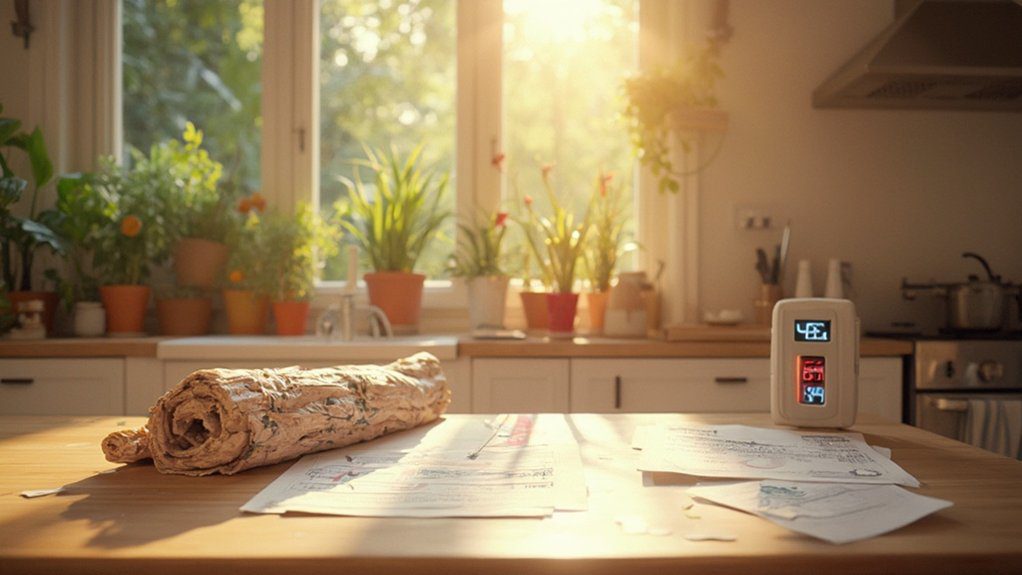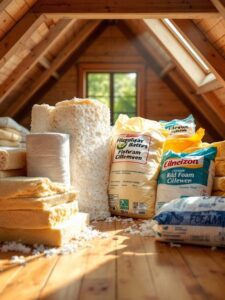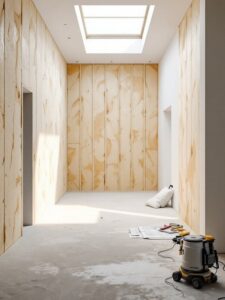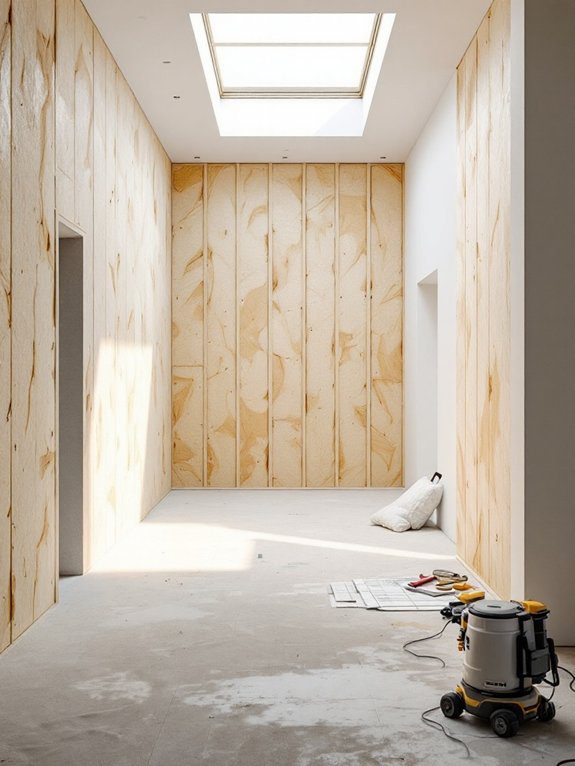You can claim up to £1,800 in free home insulation through GBIS or ECO4 government schemes before March 2026. If your home has an EPC rating of D or below, you’ll qualify for GBIS as a middle-income household, while ECO4 supports low-income families receiving benefits. Both programs cover various insulation types, including cavity wall, loft, and solid wall solutions. Your annual energy savings could reach £375, depending on your property type. Let’s explore which grant matches your situation.
Key Takeaways
- Free insulation grants worth up to £1,800 are available through GBIS and ECO4 schemes until March 2026.
- GBIS targets homes with EPC rating D or below, while ECO4 focuses on households receiving qualifying benefits.
- Quick 15-20 minute application process with approved installers contacting eligible applicants within 5 working days.
- Homeowners can save 25-35% on energy bills through various insulation types including cavity wall, loft, and solid wall.
- Both private homeowners and renters can apply, with landlord permission required for rental properties.
Understanding the Great British Insulation Scheme (GBIS) and ECO4

While energy bills continue to rise across the UK, two major government initiatives – the Great British Insulation Scheme (GBIS) and ECO4 – offer significant support for home insulation improvements.
You’ll find that GBIS, launched in 2023, specifically targets middle-income households, providing government funding for cavity wall and loft insulation. This scheme helps you save up to £300 yearly on energy bills while reducing your home’s carbon footprint.
ECO4, running until March 2026, focuses on supporting low-income households and those receiving certain benefits. The insulation benefits under ECO4 are more extensive, covering various measures including solid wall insulation, room-in-roof insulation, and underfloor insulation.
You could qualify for both schemes depending on your circumstances, making it easier to create an energy-efficient home without breaking the bank.
Who Qualifies for Free Home Insulation Grants?
Wondering if you’re eligible for free home insulation grants? Your qualification depends on two main factors: your household income and your property type.
You’ll likely qualify for the GBIS if you live in a home with an Energy Performance Certificate (EPC) rating of D or below and fall within specific income thresholds.
For ECO4, you’re eligible if you receive qualifying benefits like Universal Credit, Pension Credit, or Child Tax Credits. Even if you’re not on benefits, you might still qualify through your local authority’s guidelines.
Both schemes cover various property types, including privately owned homes and rental properties.
If you live in social housing, own your home, or rent from a private landlord, you could be eligible – as long as you have your landlord’s permission for the improvements.
Types of Insulation Covered by Government Grants

Government insulation grants cover four main types of home insulation, each targeting different areas of heat loss in your property.
You’ll find support for cavity wall insulation, which fills the gap between your home’s inner and outer walls with efficient insulation materials.
Loft insulation is another key option, where installers lay thermal material across your attic floor to prevent heat from escaping through the roof.
Solid wall insulation, while more complex, offers significant benefits for older properties, using either external or internal installation methods.
The fourth type, underfloor insulation, helps eliminate cold spots by insulating the space beneath your ground floor.
Each of these solutions can dramatically reduce your energy bills and create a more comfortable living environment, making them valuable investments for your home’s future.
Step-by-Step Application Guide
To begin your insulation grant application, you’ll need to complete a simple eligibility check through your local authority’s website or the government’s official energy savings portal.
The application process typically takes 15-20 minutes to complete.
You’ll need to provide proof of benefits (if applicable), household income details, and your property’s Energy Performance Certificate (EPC).
If you don’t have an EPC, don’t worry – the assessor can arrange one for free during your home survey.
Once you’ve submitted your application, an approved installer will contact you within 5 working days to schedule a property assessment.
They’ll confirm which insulation measures your home needs and calculate your grant amount.
After you approve the work plan, installation can usually begin within 2-4 weeks.
Expected Energy Bill Savings After Installation

After installing proper home insulation, homeowners typically save 25-35% on their annual heating and cooling costs.
These energy savings translate directly to lower utility bills year-round. You’ll notice the insulation benefits immediately, with more consistent indoor temperatures and reduced energy waste.
Real-world cost reductions you can expect:
- A semi-detached house could save £285-375 annually on heating bills
- Cavity wall insulation can reduce energy bills by £165 per year
- Loft insulation typically saves households £180-250 each year
These savings mean your insulation grant can effectively pay for itself through reduced energy costs.
Plus, you’ll contribute to reducing carbon emissions while enjoying a more comfortable home.
With energy prices continuing to rise, there’s never been a better time to invest in proper home insulation.
Key Deadlines and Important Dates to Remember
While insulation grants are available year-round, several key deadlines affect your ability to secure funding.
You’ll want to submit your application for the Great British Insulation Scheme (GBIS) before March 2026, when the current program ends. For ECO4 funding, you’ve got until March 2026 to apply, but don’t wait – application timelines can take 4-6 weeks to process.
Remember that grant renewal periods typically begin in April each year, bringing potential changes to eligibility criteria and funding amounts.
You’ll increase your chances of approval by applying early in the financial year when funding pools are fullest. If you’re claiming benefits, verify your circumstances are up-to-date before applying, as this can impact your eligibility.
Stay ahead by checking your local council’s website for any additional regional deadlines.
Getting Help With Your Grant Application

Need assistance with your insulation grant application? You’re not alone – thousands of homeowners seek help maneuvering the process each year.
Our dedicated support team offers free grant application tips and guidance to guarantee you don’t miss out on available funding.
Get support through these assistance resources:
- Contact our helpline advisors who’ll walk you through each application step and verify your eligibility
- Use our online chat service for real-time answers to your questions about the GBIS or ECO4 schemes
- Book a free consultation with our grant specialists who’ll help complete your paperwork correctly
We’ve simplified the process to help you access the funding you deserve.
Don’t let complex forms stand between you and up to £1,800 in insulation grants – reach out today and let’s guide you through your application.
Frequently Asked Questions
Can I Choose My Own Insulation Installer for the Grant Work?
With 43% of UK homes needing better insulation, you’ll need to use approved insulation installers for most grant options. You can’t choose your own contractor, but you’ll get vetted professionals for quality assurance.
What Happens if the Grant Doesn’t Cover the Total Installation Cost?
If your grant coverage doesn’t meet the full cost, you’ll need to pay the difference. Don’t worry – many installers offer flexible funding options like payment plans to help make the remaining amount more manageable.
How Long Does the Entire Installation Process Typically Take?
You’ll be enjoying a cozier home in no time! The installation timeline typically takes 1-2 days for most properties. With project efficiency in mind, your installers will work quickly to minimize disruption to your routine.
Will the Installation Work Cause Significant Disruption to My Daily Routine?
You’ll experience minimal disruption during installation. While there’ll be some noise during working hours, you can still use most of your home. Most customers find the short-term installation timeline worth the long-term benefits.
Are There Any Maintenance Requirements After the Insulation Is Installed?
“An ounce of prevention is worth a pound of cure!” You’ll be glad to know that post installation care is minimal. Your insulation’s longevity typically requires only annual visual checks for moisture or damage.
Conclusion
Just like a warm winter coat protects you from the cold, proper home insulation shields your wallet from rising energy costs. Don’t let these generous grants slip through your fingers – you’ve got until 2026 to claim up to £1,800 in free insulation through GBIS or ECO4. Take action now: check your eligibility, submit your application, and join thousands of homeowners who’re already enjoying cozier homes and lower bills.









25 Responses
The core of your writing while appearing agreeable originally, did not work properly with me personally after some time. Somewhere throughout the sentences you managed to make me a believer unfortunately only for a short while. I still have got a problem with your jumps in logic and you would do nicely to fill in those gaps. In the event you can accomplish that, I will certainly be impressed.
Aw, this was a really nice post. In thought I want to put in writing like this moreover – taking time and precise effort to make an excellent article… however what can I say… I procrastinate alot and under no circumstances seem to get something done.
Absolutely pent subject matter, Really enjoyed examining.
I’ve read several excellent stuff here. Definitely price bookmarking for revisiting. I surprise how so much attempt you set to make this kind of fantastic informative site.
I am not sure where you’re getting your info, however good topic. I needs to spend some time finding out more or figuring out more. Thanks for great information I used to be on the lookout for this information for my mission.
Precisely what I was searching for, appreciate it for putting up.
Hi are using WordPress for your site platform? I’m new to the blog world but I’m trying to get started and set up my own. Do you require any html coding expertise to make your own blog? Any help would be greatly appreciated!
I do not even know how I ended up here, but I thought this post was good. I do not know who you are but definitely you are going to a famous blogger if you aren’t already 😉 Cheers!
I don’t think the title of your enticle matches the content lol. Just kidding, mainly because I had some doubts after reading the enticle. https://www.binance.com/register?ref=IHJUI7TF
Luôn chơi có trách nhiệm, kiểm soát cảm xúc, tránh tâm lý “gỡ gạc” khi thua. – Đọc kỹ các quy định, chính sách của 66b uy tín trước khi tham gia để bảo vệ quyền lợi cá nhân. – Đảm bảo thông tin tài khoản, giao dịch được bảo mật an toàn.
Hello my family member! I wish to say that this post is awesome, nice written and include almost all important infos. I would like to look more posts like this .
Thanks for sharing. I read many of your blog posts, cool, your blog is very good.
I simply could not go away your site before suggesting that I actually loved the standard info an individual provide for your guests? Is going to be back regularly in order to check out new posts.
Thanks for all of the efforts on this blog. My mom loves managing research and it’s simple to grasp why. We know all concerning the lively form you render invaluable ideas by means of your blog and therefore improve response from other people on the theme plus our own girl is starting to learn so much. Enjoy the rest of the year. You’re the one doing a dazzling job.
Thank you for your sharing. I am worried that I lack creative ideas. It is your article that makes me full of hope. Thank you. But, I have a question, can you help me?
I have been surfing online more than 3 hours today, yet I never found any interesting article like yours. It’s pretty worth enough for me. Personally, if all webmasters and bloggers made good content as you did, the web will be a lot more useful than ever before.
Thanks for sharing. I read many of your blog posts, cool, your blog is very good.
Your point of view caught my eye and was very interesting. Thanks. I have a question for you.
Can you be more specific about the content of your article? After reading it, I still have some doubts. Hope you can help me. https://accounts.binance.com/en/register?ref=JHQQKNKN
I discovered your weblog website on google and test a number of of your early posts. Proceed to keep up the superb operate. I simply additional up your RSS feed to my MSN News Reader. Looking for ahead to studying more from you later on!…
As soon as I observed this internet site I went on reddit to share some of the love with them.
Your point of view caught my eye and was very interesting. Thanks. I have a question for you. https://accounts.binance.com/id/register-person?ref=UM6SMJM3
As soon as I noticed this internet site I went on reddit to share some of the love with them.
Can you be more specific about the content of your article? After reading it, I still have some doubts. Hope you can help me.
Can you be more specific about the content of your article? After reading it, I still have some doubts. Hope you can help me. https://accounts.binance.com/en-ZA/register?ref=B4EPR6J0